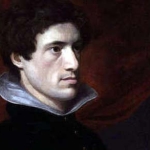I saw where in the shroud did lurk
A curious frame of Nature's work.
A flow'ret crushed in the bud,
A nameless piece of Babyhood,
Was in a cradle-coffin lying;
Extinct, with scarce the sense of dying;
So soon to exchange the imprisoning womb
For darker closets of the tomb!
She did but ope an eye, and put
A clear beam forth, then strait up shut
For the long dark: ne'er more to see
Through glasses of mortality.
Riddle of destiny, who can show
What thy short visit meant, or know
What thy errand here below?
Shall we say, that nature blind
Check'd her hand, and changed her mind,
Just when she had exactly wrought
A finish'd pattern without fault?
Could she flag, or could she tire,
Or lack'd she the Promethean fire
(With her nine moons' long workings sicken'd)
That should thy little limbs have quicken'd?
Limbs so firm, they seem'd to assure
Life of health, and days mature:
Woman's self in miniature!
Limbs so fair, they might supply
(Themselves now but cold imagery)
The sculptor to make beauty by.
Or did the stern-eyed fate descry,
That babe, or mother, one must die;
So in mercy left the stock,
And cut the branch; to save the shock
Of young years widow'd; and the pain,
When Single State comes back again
To the lone man who, 'reft of wife,
Thenceforward drags a maimed life?
The economy of heaven is dark;
And wisest clerks have miss'd the mark,
Why Human Buds, like this, should fall,
More brief than fly ephemeral,
That has his day; while shrivel'd crones
Stiffen with age to stocks and stones;
And crabbed use the conscience sears
In sinners of an hundred years.
Mother's prattle, mother's kiss,
Baby fond, thou ne'er wilt miss.
Rites, which custom does impose,
Silver bells and baby clothes;
Coral redder than those lips,
Which pale death did late eclipse;
Music framed for infants' glee,
Whistle never tuned for thee;
Though thou want'st not, thou shalt have them,
Loving hearts were they which gave them.
Let not one be missing; nurse,
See them laid upon the hearse
Of infant slain by doom perverse.
Why should kings and nobles have
Pictured trophies to their grave;
And we, churls, to thee deny
Thy pretty toys with thee to lie,
A more harmless vanity?



















Comment form: